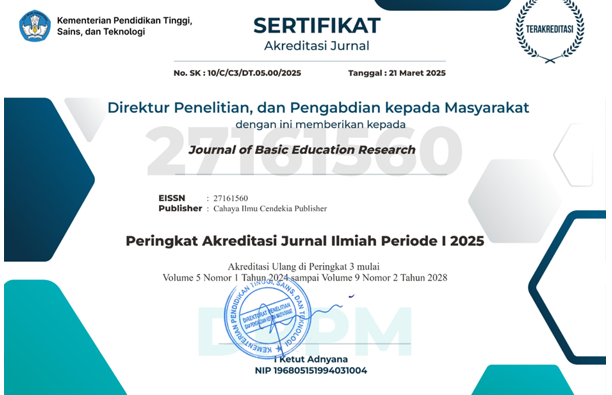Integrating Ethnopedagogy in Economic Activities: A Case Study of Rice Farming in the Ciptagelar Community
Abstract
Purpose of the Study: This research aims to explore the role of ethnopedagogy in shaping the economic activities of the Ciptagelar community, particularly within the context of rice farming. By examining traditional educational practices, the study seeks to understand how local wisdom is integrated into economic life, contributing to sustainable development and intergenerational knowledge transfer.
Methodology: The study employs a descriptive qualitative approach using a case study method to gain an in-depth understanding of the lived experiences of the Ciptagelar community. The research involved seven key informants, including members of the Rorokan and local farmers. Data were collected through interviews, observations, and documentation, focusing on the intersection of education and economic practices in this traditional community.
Main Findings: The findings demonstrate that ethno-pedagogy plays a central role in the economic activities of the Kasepuhan Ciptagelar, particularly in rice farming. Critical elements of Ethno pedagogy, such as planning, creating a conducive learning environment, material selection, and inheritance of knowledge, are closely tied to rice farming. For example, rice farming is planned meticulously, with harvests limited to once a year, and harvested rice is prohibited from being sold, ensuring sustainability.
Novelty/Originality of this Study: This study offers a novel perspective by integrating ethnopedagogy into the analysis of economic activities. It reveals how traditional learning processes influence sustainable agricultural practices. It underscores the importance of cultural education in preserving economic self-sufficiency and provides a unique model for community-based education rooted in local wisdom.
References
D. K. Gurel, A. Eryilmaz, and L. C. McDermott, “A review and comparison of diagnostic instruments to identify students’ misconceptions in science,” Eurasia J. Math. Sci. Technol. Educ, vol. 11, no. 5, pp. 989–1008, 2015, doi: 10.12973/eurasia.2015.1369a.
Alhamuddin, A. Fanani, I. Yasin, and A. Murniati, “Politics of education in curriculum development policy in indonesia from 1947 to 2013: A Documentary Research,” J. Pendidik. Islam, vol. 9, no. 1, pp. 29–56, 2020, doi: 10.14421/jpi.2020.91.29-56.
F. N. Batubara and M. Davala, “Curriculum development in indonesia: Historical study,” Int. J. Students Educ, vol. 2, no. 1, pp. 29–34, 2023, doi: 10.62966/ijose.v2i1.257.
A. Torres, “Teachers quality and education equality achievenments in Indonesia,” Int. J. Instr, vol. 14, no. 3, pp. 463–480, 2021, doi: 10.29333/iji.2021.14245a.
I. Fadhil and A. Sabic-El-Rayess, “Providing equity of access to higher education in indonesia: A policy evaluation,” Indones. J. Learn. Adv. Educ, vol. 3, no. 1, pp. 57–75, 2021, doi: 10.23917/ijolae.v3i1.10376.
H. Jatmiko and N. Asriati, “Preventing ARPS (Children Vulnerable to Dropping Out of School): A comprehensive approach to keep children in school,” EDUTEC J. Educ. Technol, vol. 6, no. 4, pp. 486–496, 2023, doi: 10.29062/edu.v6i4.594.
M. M. Fabre and N. C. Osias, “Teachers’ core behavioral competencies and school performance: Basis for school development plan,” Am. J. Arts Hum. Sci, vol. 3, no. 2, pp. 181–214, 2024, doi: 10.54536/ajahs.v3i2.2862.
I. Ilfiandra, N. A. Nadhirah, and D. Suryana, “Meta-ethnography of local wisdom total peace of urang sunda and its implications to peace pedagogy,” Atlantis Press SARL, 2023. doi: 10.2991/978-2-38476-034-3_17.
E. Elihami, “Describing of ethnopedagogical leadership contribution to towani tolotang community based on local wisdom values in elementary schools,” Mahaguru J. Pendidik. Guru Sekol. Dasar, vol. 3, no. 1, pp. 55–60, 2022, doi: 10.33487/mgr.v3i1.3316.
A. G. Mikhaylova, “The role of intercultural sensitivity in ethnocultural communication kültürlerarasi duyarliliğin etnokültürel etkileşimdeki rolü,” Int. J. Ethnopedagogy, vol. 3, no. 1, pp. 0–2, 2023.
Y. Rahmawati et al., “Developing elementary school students’ scientific literacy through the integration of ethnopedagogy,” AIP Conf. Proc, vol. 2331, no. April, 2021, doi: 10.1063/5.0041916.
M. M. Sjøen, “From global competition to intercultural competence: What teacher-training students with cross-cultural teaching experience should be learning,” Scand. J. Educ. Res, vol. 67, no. 1, pp. 140–153, 2023, doi: 10.1080/00313831.2021.1990121.
A. Suryani, S. Soedarso, K. T. Diani, and R. Rosmawati, “English teaching in social and cultural contexts: Language teachers as cultural managers,” LLT J. A J. Lang. Lang. Teach, vol. 23, no. 2, pp. 273–292, 2020, doi: 10.24071/llt.v23i2.2470.
N. Zarrinabadi, M. Rezazadeh, M. Karimi, and N. M. Lou, “Why do growth mindsets make you feel better about learning and your selves? The mediating role of adaptability,” Innov. Lang. Learn. Teach, vol. 16, no. 3, pp. 249–264, 2022, doi: 10.1080/17501229.2021.1962888.
L. Jia, C. H. Lim, I. Ismail, and Y. C. Tan, “Stunted upward mobility in a learning environment reduces the academic benefits of growth mindsets,” Proc. Natl. Acad. Sci. U. S. A, vol. 118, no. 10, 2021, doi: 10.1073/pnas.2011832118.
S. A. Sakti, S. Endraswara, and A. Rohman, “Revitalizing local wisdom within character education through ethnopedagogy apporach: A case study on a preschool in Yogyakarta,” Heliyon, vol. 10, no. 10, p. e31370, 2024, doi: 10.1016/j.heliyon.2024.e31370.
A. Gunardi, A. Muhyidin, S. M. Leksono, and U. Jamaludin, “Ethnopedagogy as an approach to primary education,” Cendikia Media J. Ilm. Pendidik, vol. 14, no. 6, pp. 654–661, 2024.
H. Rohmah, S. Rena, P. Pahrurraji, and F. Syarif, “Implementation of multicultural education values in senior high school,” At-tadzkir Islam. Educ. J., vol. 2, no. 2, pp. 78–94, 2023, doi: 10.59373/attadzkir.v2i2.29.
K. Anwar, “Multicultural education in pancasila village and moderation of diversity in indonesia,” J. Pendidik. Islam, vol. 4, no. 2, p. 2021,
Ilfiandra and M. Saripudin, “Ethnopedagogy: Exploring peaceful traditions of indonesia’s sundanese indigenous communities,” Educ. Peace through Countering Violence Strateg. Curric. Instr., pp. 114–134, 2023, doi: 10.4324/9781003383468-9.
E. Yana, A. Anisah, and A. Yulianto, “Ethnopedagogical study of local wisdom values as a source of learning for forming economic behavior,” J. Innov. Educ. Cult. Res, vol. 4, no. 3, pp. 534–543, 2023, doi: 10.46843/jiecr.v4i3.910.
G. N. Pertiwi, S. Z. Agustina, and I. Rosmilawati, “Ethnopedagogical approach in educating elementary school students on the implementation of clean and healthy behaviour,” Ideguru J. Karya Ilm. Guru, vol. 9, no. 2, pp. 845–852, 2024, doi: 10.51169/ideguru.v9i2.899.
I. Nursima, Y. C. Lah, and N. A. T. Duong, “Ethnopedagogy in primary schools: ethnographic study in thematic learning at Ma’arif Setono Jenangan Ponorogo,” J. Basic Educ. Res, vol. 3, no. 3, pp. 106–116, 2022, doi: 10.37251/jber.v3i3.896.
E. Komara, Yudikusyadi, and N. Meliyani, “Integration of local wisdom values of seren taun traditional ceremony in social science lesson as learning model of ethnopedagogy in SMPN 1 Nagrak District of Nagrak Regency of Sukabumi,” İlköğretim OnlineElementary Educ. Online, vol. 20, no. 3, 2021, doi: 10.17051/ilkonline.2021.03.35.
S. Zubaidah and F. Arsih, “Indonesian culture as a means to study science,” AIP Conf. Proc, vol. 2330, no. April, 2021, doi: 10.1063/5.0043173.
N. R. A. Romm, “An indigenous relational approach to systemic thinking and being: Focus on participatory Onto-Epistemology,” no. 0123456789. Springer US, 2024. doi: 10.1007/s11213-024-09672-4.
V. Glonti, V. Trynchuk, I. Khovrak, G. Mokhonko, M. Shkrobot, and L. Manvelidze, “Research podgorica socialization of organization sustainable development based on the principles of corporate social responsibility,” Montenegrin J. Econ, vol. 16, no. 1, pp. 169–182, 2020, doi: 10.14254/1800-5845/2020.16-1.11.
L. Albareda and A. J. G. Sison, “Commons Organizing: Embedding Common Good and Institutions for Collective Action. Insights from Ethics and Economics,” J. Bus. Ethics, vol. 166, no. 4, pp. 727–743, 2020, doi: 10.1007/s10551-020-04580-8.
I. Widianingsih, J. J. McIntyre, U. S. Rakasiwi, G. H. Iskandar, and R. Wirawan, “Indigenous Sundanese Leadership: Eco-Systemic Lessons on Zero Emissions: A conversation with Indigenous leaders in Ciptagelar, West Java,” vol. 36, no. 2. Springer US, 2023. doi: 10.1007/s11213-022-09606-y.
Y. Andayani, Y. A. S. Anwar, A. Hakim, and E. Hidayanti, “Ethnopedagogy Approach in Chemistry Learning as an Effort to Strengthen Students’ Cultural Identity,” Atlantis Press International BV, 2023. doi: 10.2991/978-94-6463-130-2_17.
Copyright (c) 2024 Tasya Khoerunnisa, Quang Van Son

This work is licensed under a Creative Commons Attribution 4.0 International License.
Authors who publish with this journal agree to the following terms:
- Authors retain copyright and acknowledge that the Journal of Basic Education Research is the first publisher licensed under a Creative Commons Attribution 4.0 International License.
- Authors are able to enter into separate, additional contractual arrangements for the non-exclusive distribution of the journal's published version of the work (e.g., post it to an institutional repository or publish it in a book), with an acknowledgment of its initial publication in this journal.
- Authors are permitted and encouraged to post their work online (e.g., in institutional repositories or on their website) prior to and during the submission process, as it can lead to productive exchanges and earlier and greater citation of published work.





.png)


.png)
.png)


















